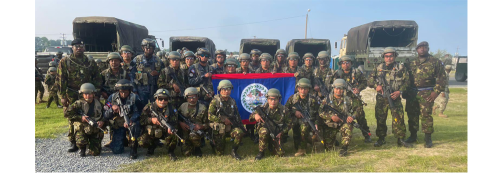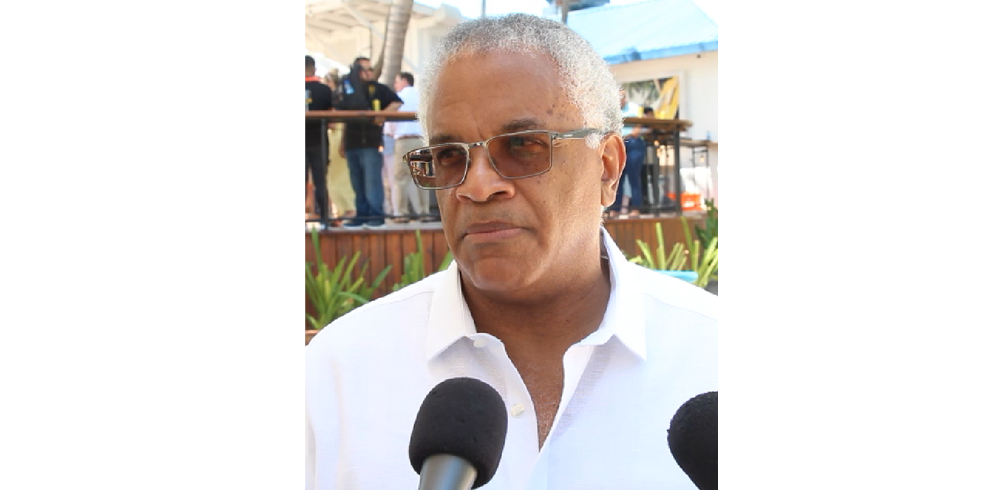Photo: Eamon Courtenay – Minister of Foreign Affairs
BELIZE CITY, Wed. Oct. 4, 2023
With a vote of 13 in favour and two abstentions, the United Nations Security Council on Monday, October 2, approved the formation and deployment of a Multinational Security Support (MSS) Mission to Haiti that would function in close cooperation and coordination with the Government of Haiti. According to the Security Council’s Resolution 2699 (2023), the duration of the mission would be for an initial period of 12 months. A review would follow in July 2024, or 9 months after the adoption of the resolution.

Belize and several other CARICOM countries have indicated their willingness, in principle, to join the mission. Foreign Minister Eamon Courtenay today, Wednesday, October 4, indicated that the U.N. Security Council’s approval was one requirement for Belize to participate. Another is understanding the command structure to be led by Kenya (which announced its willingness to lead a multinational mission to Haiti on July 29, 2023). A third requirement is that the expenses of Belize’s participation are covered, as Belize will not incur any cost.
The initial number of soldiers that the Belize Defence Force (BDF) said would be trained in preparation of Belize deciding to participate in the mission was a platoon of 28. Minister Courtenay has provided an update, stating that the BDF now says it can send up to 50 elements. However, he says the matter will be discussed in Cabinet next week for final determination. According to Minister Courtenay, the Ministry of National Defence is finalizing a list of requirements, including costs. Courtenay commented, “When Kenya is ready, we will have to be satisfied that the circumstances, the arrangements/the cost defrayment is in place, before Belize finally takes a decision to move forward.”
Saying he understands that this is a matter of concern to Belizeans, Courtenay has affirmed that Belize should be able to exit when it wishes; therefore, the exit strategy of the mission should be clear. Also, he says the recommendation to Cabinet will be that the Belize contingent only participates in a defensive posture. By that he means that a static force would simply defend strategic assets in Haiti, rather than engage directly with gangs. He noted that after Kenya sent in a first assessment team, it concluded that the mission has to engage with the gangs. Courtenay, however, insists that “Belize will not be involved in that part. We would be there to defend, let’s say for example, a gas depot, or to defend the parliament or any particular asset in a defensive posture. But not going out looking for gangs to engage them. So, we are waiting for final advice and recommendations from the security forces, the National Security Directorate, the Belize Defence Force, Coast Guard, etc. to see what is the final configuration for Belize, and we have to be satisfied that other externalities are in place so that there is no cost to Belize and the loss of life or injury is absolutely minimized.”
Amandala is reliably informed that the Commanding Officer for the BDF’s Second Infantry Battalion has been asked to gather the names of soldiers who are interested in the deployment and to submit those by Friday, October 6. A selection would follow.
According to the U.N. Security Council resolution, on October 6, 2022, Haiti’s Council of Ministers made an appeal “for the deployment of a specialized international force and technical assistance to support the Haitian National Police’s efforts to address high levels of gang violence and re-establish security…” Another letter from Haiti was received on September 22, 2023. The resolution stresses that as soon as the necessary security conditions are met, there should be “transparent, inclusive and credible electoral processes and free and fair elections…”
The cost of what is described as a “temporary operation” is to be borne by voluntary contributions and support from individual Member States and regional organizations. The United States pledged US $200 million toward the effort even before the U.N. Security Council greenlighted the mission.
Based on international news reports, Haiti’s National Police force only has about 10,000 active officers for a population of 11.45 million (2021 estimate). Al Jazeera also reports that up to 80% of the nation’s capital, Port Au Prince, is currently controlled by armed groups and criminal networks, with up to 2,400 people having been killed this year and nearly a 1,000 kidnapped.
Member States and regional organizations who wish to contribute personnel, equipment and financial and logistic resources are asked to notify the MSS, the Security Council and the U.N. Secretary General in writing. Likewise, Haiti and the MSS are asked to provide regular updates to the Security Council of the progress of deployment.
The MSS mission is asked to “take fully into account child protection and the protection of other vulnerable groups as a crosscutting issue throughout its mandate in all the planning and conduct of its operations.” The leadership of the MSS in coordination with the Government of Haiti and participating Member States is required to inform the Security Council of its concept of operations, sequence of deployment, mission goals and end state, rules of engagement and financial needs. The U.N. Security Council Resolution also emphasizes that the mission should ensure the “highest standards of transparency, conduct and discipline for their contingents.” That includes a mechanism for investigation and repatriation in the event there is credible evidence of misconduct. It notes that there should be a “robust compliance mechanism to prevent, investigate, address and publicly report violations or abuses of human rights related to the MSS.” In that regard, the MSS must also establish an oversight mechanism to prevent human rights violations or abuses. Member States are additionally being required to adopt “appropriate wastewater management and other environmental controls to guard against the introduction and spread of water-borne diseases.”
Once the mission is on the ground, it is to provide reports every three months to the Security Council. The mission is also required to cooperate with the United Nations Integrated Office in Haiti (BINUH) and relevant UN agencies including the UNODC and the Office of the High Commissioner for Human Rights.
In a September 26, 2023 letter opposing a multinational mission to Haiti, YaYa Marin Coleman, chairperson of the UBAD Educational Foundation (UEF), tells Cabinet Secretary Stuart Leslie, “The truth is, Black people from CARICOM countries are being used by CARICOM Black leaders to participate in the harm, repression, and murder of our Black family members in Ayti/Haiti.” She added that our security forces would be sent to “risk their lives in the continuous international occupation of Haiti.” Marin Coleman questioned how the Government of Belize arrived at the decision to send Belizean security forces to Haiti, and whether the Belizean people were informed prior to this decision being shared with the diplomatic corps in Belize.
Marin Coleman also explains that the “gangs” whom officials reference are actually paramilitaries who are “the outcome of two decades of US/UN/foreign intervention and destabilization of Haitian society that began with the 2004 armed overthrow of the democratic progressive government of President Jean-Bertrand Aristide. These death squads are the henchmen of a series of unelected puppet governments put in place by the US after the coup – governments headed by corrupt Haitian officials willing to prioritize foreign profits over the lives of their own people.”
As to why what Marin Coleman identifies as a “foreign military invasion” is not the answer to the Haiti crisis, she writes, “Because the US cannot fix what it has broken – the arsonists cannot put out the fire. Ayti/Haiti has had enough of foreign invaders with military troops seizing land, resources, and labour to benefit themselves while conducting armed assaults against the population, undermining Haitian institutions and spreading sexual violence and cholera in their path. Rather than respecting the will of the people by withdrawing support for the unpopular right-wing regime, the US is doubling down, pressuring the UN Security Council to authorize more occupation, militarism and invasion. They have enlisted the government of Kenya to help do their dirty work by fronting a new invasion. They are determined to prop up the government they imposed on Ayti/Haiti.” As to a solution, Marin Coleman indicates that “The solution put forth by the majority of Aytian/Haitian people is an end to US/UN support for the illegitimate, unpopular PHTK regime. Broad sectors of Haitian civil society propose a transitional government of their own choosing to guarantee security, enable people to return to homes, school and work, and plan for future elections”.

